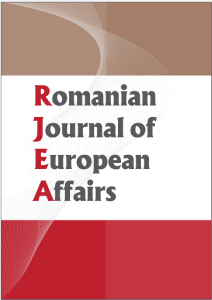Between Rhetoric and Action: Reflections on Romania’s European Union Accession and Political Conditionality – The Views from Brussels and Bucharest
Geoffrey Pridham
Abstract:
The role of political elites is an important theme in the study of EU enlargement; but how this relates to domestic politics is often neglected. This theme is applied to Romania, with a focus on the problems of implementing the EU’s political conditions. Firstly, attention is given to the conditionality policy adopted by Brussels with respect to Romania; and then, secondly, attention turns to Bucharest. The analysis of Romanian responses is based on a distinction between political will and political capacity. While there are some positive elite characteristics relating to the will factor, although complicated by instrumental attitudes towards conditionality, various problems of political capacity help much to explain Romania’s persistent difficulties for much of the accession period in meeting Brussels’ demands.
Keywords: democratisation, EU accession, EU enlargement, political elites, Romania
Globalization, Regionalization and the EU – Japan – U.S. Triad
Adrian Pop
Abstract:
The globalization triggers macro-regionalization, which, in its turn, generates micro-regionalization – the EU being a good example of both. Second, in virtually all scenarios of geopolitical future the recurrent theme is regionalism, which comes in various “shapes and sizes”. That is why maybe we should start to live with the idea of a sort of regionalization by default. Third, how the relationship among the members of the EU-Japan-U.S. triad will look like in future will depend to a large extent on how the American power is going to prevail within the Western world and how it is going to handle the reassertion of countries belonging both to the Western and non-Western worlds. The various possible outcomes entail a plethora of varieties of geopolitical realignments.
Keywords: EU, geopolitics, globalization, Japan, regionalization, US
The Balkans between the EU and NATO: Focusing on the Former Yugoslavia
Mamoru Sadakata
Abstract:
The fragmentation of Yugoslavia has wrought extensive political and social changes in the Balkans and Europe more generally. After the collapse of communism and the breakup of Yugoslavia, many Balkan countries have transformed their political system and have begun to forge new foreign and security policy. Some of them have already joined the EU and NATO, and some are about to access these organizations. But the Western Balkan states seem to be farther in the future. In regard to the former Yugoslavia, the United States, European states and international organizations, such as the EU, NATO and UN, have attempted to engage and manage this breakup on an individual and collective basis. They have greatly influenced the process of the post-conflict nation building of this region. From this viewpoint, the paper discusses the political and social transformation of the Balkans after the breakup of the Yugoslav conflict, and the role of the EU and NATO in the process of the democratization and nation building in the former Yugoslavia. Moreover, attention is paid to the features of the involvement of the EU and NATO in the former Yugoslav conflict. In the process of Yugoslav fragmentation one can see the ‘Eastern Question’ revisited and the ‘Powder keg of Europe’ once again rising to its brim.
Keywords: Bosnia-Herzegovina, Kosovo, NATO, South Eastern Europe, Stability Pact, Western Balkans, Yugoslavia
The Impact of EU Accession on the Development of Administrative Capacities in the States in Central and Eastern Europe. Similar Developments in Russia?
Alfred E. Kellermann
Abstract:
The developments of the civil service and administrative reform in Central and Easter European countries and in Russia are more or less similar. For the Central and Eastern European countries explicitly EU Membership is mentioned as an incentive for reform, the accession criteria have even been enlarged with horizontal administrative capacities, whereas for Russia there are no explicit references to incentives for reform.
Keywords: Central and Eastern Europe, EU accession, Russia
The Legal Personality of the European Union – Between the Maastricht Treaty and the Draft Treaty Establising a Constitution for Europe – Reality and Pperspectives
Octavian Gabriel Pascu , Caius Tudor Luminosu
Abstract:
The scope of the present article is to present an overview of the prevailing and accepted opinion on the legal personality of the European Union. The starting point of the presentation is the analysis of the structural differences between the EU and the European Communities. Then followed by the institutional delimitation and the differentiation of these bodies within the European Construct with regard to actual European Law. After a brief presentation of the legal nature of the EU and its lack of legal personality and legal capacity, a scrutiny of the international law requirements to international law subjectivity of the EU is performed with the same result, but this time on international law level, denying the state character of the Union. This also represents the prevailing opinion in German literature, denying the existence of a legal personality of the EU on a public and international law level with respect to the actual European law. Further, we undertake an analysis on the international law effects of the lacking legal capacity of the Union. This is followed by a short exposition of the effects on European institutions of the awarding of legal personality to the EU. In the final part of the present article the focus is on the new European Constitution, still to be adopted by the member states, which expressly provides the fact that the Union is granted the legal personality and its implication on the present situation in the literature.
Keywords: community law, legal personality, Maastricht Treaty, Treaty establishing a Constitution for Europe
Recent Advances in Territorial Competition and Competitiveness Analysis
Daniela-Luminita Constantin






